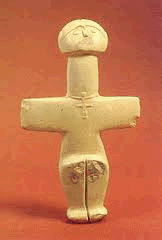|
 Cyprus: A meeting point of great world civilizations Cyprus: A meeting point of great world civilizations
The History and Culture of Cyprus is among the oldest in the world. The first signs of civilization traced in archaeological excavations and research date back 9,000 years to the 7th millennium BC. This rich cultural landscape involves hundreds of archaeological sites scattered throughout the island, representing various historical periods in the island's evolution.
The discovery of copper in Cyprus in the 3rd millennium BC brought wealth to the island and attracted trade from its trading neighbors. Yet, although geographically placed at the crossroads of three continents Europe, Asia and Africa and a meeting point of great world civilizations, Cyprus has developed and for centuries maintained, its own civilization. It remained a center of Greek culture with Hellenistic, Roman, Byzantine, French, Venetian, Ottoman and British influences.
The Cyprus Department of Antiquities is tasked with the operation, maintenance, protection and preservation of the rich archaeological heritage of the island. Its activities comprise such areas as excavation and conservation of artifacts, the preservation of ancient monuments, the protection of ethnological and ecclesiastical art, the restoration of buildings of traditional architecture etc. The final goal of all these activities is the presentation of the island's unique cultural property to its people and visitors for the benefit of pleasure, knowledge and artistic inspiration.
Relevant to the excavations and complementary to them is the task of maintenance and protection of ancient monuments and antiquities in general. This includes reconstruction and/or maintenance of ancient theatres, sanctuaries, castles, churches and other monuments of every nature as well as movable antiquities, metallurgy, handicraft, icons, items of religious and popular art dating back to Neolithic Times and up to 1940 A.D. Maintenance of Mosaics and frescoes is also included.
Cultural Life of Cyprus
The Cyprus Museum in Nicosia houses the richest and most representative collection of Cypriote antiquities in Cyprus. In its exhibition rooms one may see some of the most important pieces of Cypriote art and get a comprehensive picture of the Cypriote culture from the Neolithic period to the Roman times.
There are also district archaeological museums in all towns, two site museums, in Episkopi (Limassol) for the antiquities of Kourion and at Kouklia (Paphos) for the antiquities of Paleapaphos, Folk Art Museums at Yeroskipou, Lefkara and Phikardhou and an Ethnological Museum in the Nicosia House of Hadjigeorgakis Kornesios.
Most of the ancient monuments and archaeological sites on the island are open to the public and visitors may, with the aid of inexpensive guide books, tour the sites.
On the other hand ancient theatres have been fully reconstructed and host several theatrical, dance, musical and other performances. At the same time mobile Cyprus antiquities in the form of representative collections are sent abroad for exhibition. Such touring exhibitions are organized in many parts of the world.
Cypriote antiquities are also objects of scientific study during international congresses and seminars on archaeology.
Unesco World Cultural Heritage List
An achievement of the Department of Antiquities is the inclusion in 1980, of both Paleapaphos (Kouklia) and Nea Paphos (Kato Paphos) in the World Cultural Heritage List of Unesco.
In 1986 nine Byzantine Churches situated in the Troodos range, those of Agios Nicolaos tis Stegis in Kakopetria village, Agios Ioannis Lambadistis in Kalopanayiotis village, Panayia tou Moutoulla in Moutoullas village, Archangelos in Pedoulas village, Panayia tis Poditou in Galata village, Stavros tou Agiasmati in Platanistasa village and Asinou near Nikitari village were also included in the World Cultural Heritage List of Unesco.
There is an intense and active interest amongst all the people in Cyprus in fostering the creative drive in the field of Letters and the Arts and to strengthen cultural awareness.
Both the Government as well as non-governmental organizations and individuals have given high priority in making culture available to all, so that there is a greater participation and receptiveness on behalf of the public in the island's cultural life and in disseminating and projecting cultural achievements abroad in order to highlight Cyprus' links with international culture.
Particular emphasis is placed on promoting literature, music, dance (modern and classical), the visual arts and the cinema. In addition a special arts festival (The "Kypria") is organized annually with a view to upgrading the art movement on the island and highlighting its links with international culture. Since its inception, in 1993, this has become an institution making high quality cultural entertainment accessible to a wide range of people. The various performances include: theatre, ballet, opera, music. Alongside well-known international artists or ensembles, Cypriot artists who have distinguished themselves abroad and acquired international reputation are also invited to participate.
One of the most tragic consequences of the 1974 Turkish invasion and continued occupation of the northern part of Cyprus has been the deliberate destruction, looting, pillage and desecration of Cyprus unique cultural and religious heritage.
“…Cyprus’ geographical position, the deep-lying bonds which, for two thousand years, have located the island at the very fount of European culture and civilization, the intensity of the European influence apparent in the values shared by the people of Cyprus and in the conduct of the cultural, political, economic and social life of its citizens, the wealth of its contacts of every kind with the Community, all these confer on Cyprus, beyond all doubt, its European identity and character and confirm its vocation to belong to the Community».
Source: Opinion of the European Commission on the application of Cyprus for membership to the EU (1993)
|